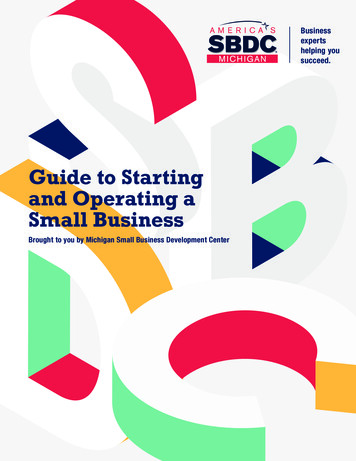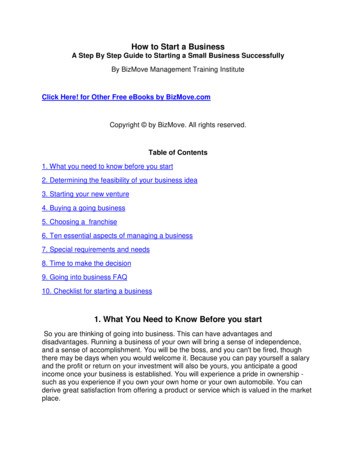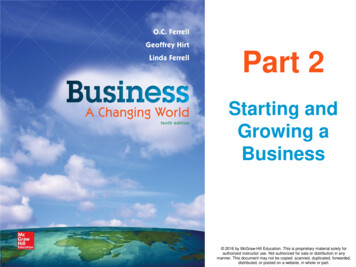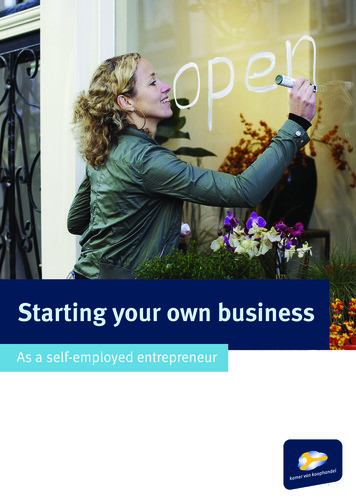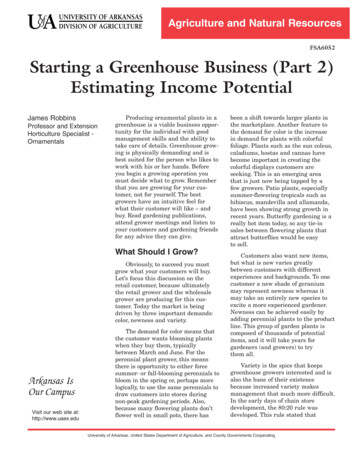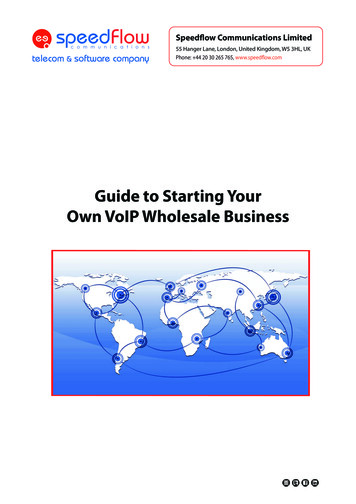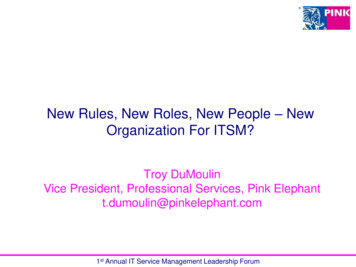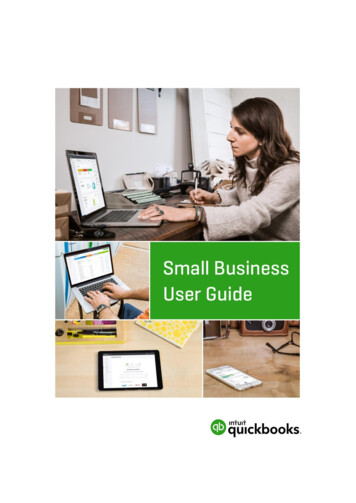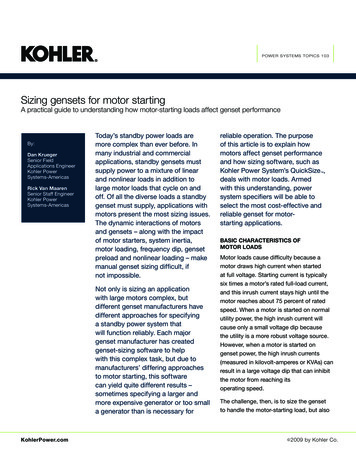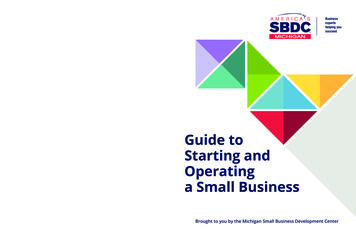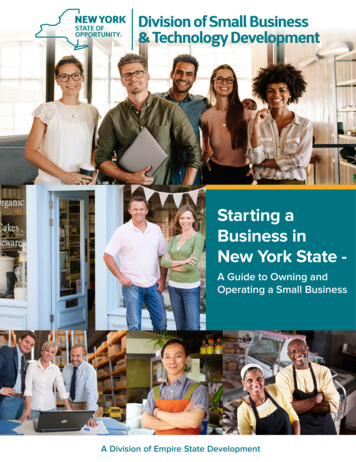
Transcription
Starting aBusiness inNew York State A Guide to Owning andOperating a Small BusinessA Division of Empire State Development
A Beginner’s Guide toStarting a Small Businessin New York StateWelcome to EntrepreneurshipThis guidebook was prepared to help you get started on the road to a successful entrepreneurshipand keep you pointed in the right direction. It gives you information about everything fromplanning and financing a business to marketing, keeping records and understanding governmentregulations. It also contains what you need to know about expanding an existing business. Inaddition to providing a solid overview of small business ownership, this guidebook will serve asa reference to the many programs and resources that are available to new business owners.For the purposes of this publication, a small business is one that is a resident in this state,independently owned and operated, not dominant in its field and employs 100 or fewer persons.These businesses are a vital part of the economic picture in New York State and across the nation.New York Business ExpressAt New York Business Express, you can learn about the licenses, permits and regulations to startinga business in New York State. New York Business Express helps users to quickly learn about andaccess resources for starting, running and growing a business in New York. The Business Wizardleads users through a series of questions to create a Custom Business Checklist that helps determinewhich New York State, as well as federal and local requirements apply to their business. The IncentiveGuide helps users to find out which New York State programs and incentives they may be eligible.At the Business Index, users can quickly and easily access forms they may need.The purpose of this guidebook is to provide general business information for anyone considering the startup or expansion of a small business in New York State. It is not intended to be an exhaustive discussion ofthe laws of New York State, since legal requirements may change from time to time and the application ofspecific laws to individual cases may vary.This Guidebook was last updated in April 2019. If there are any inactive hyperlinks, contact nylovessmbiz@esd.ny.gov
ContentsCHAPTER 1: Foundations for Success1CHAPTER 2: Mapping a Strategy7CHAPTER 3: Financing Your Venture12CHAPTER 4: Selling Yourself17CHAPTER 5: Keeping the Books24CHAPTER 6: Government Regulations31Glossary 37Appendix A: Entrepreneurship Assistance Centers39Appendix B: Small Business Development Center40Appendix C: Empire State Development Regional Offices43Appendix D: Government Agencies44Appendix E: Business Trade Associations44Appendix F: Chambers of Commerce51Appendix G: Alternative Lenders56The chapters follow thesequence of decisionsand actions that mostentrepreneurs go through,beginning with choosing andorganizing a business, whichis covered in Chapter 1.Chapter 2 takes you step-bystep through the developmentof a complete business plan,which is critical for success.Once a plan is established, youcan begin to look at financing,which is covered in Chapter 3.Your continual success willdepend to a great extent onmarketing, which is discussedin Chapter 4. In Chapter 5, youwill find a review of the recordsyou need to maintain to manageyour business and meet legalrequirements, while Chapter6 is devoted to governmentregulations, including licensingand permits, sales tax, insuranceand obligations to employees.The last few pages containinformation on resourcesavailable to you from bothpublic and private sources.
CHAPTER 1Foundations For SuccessYou have always wanted to start yourown business. You’ve thought aboutit, dreamt about it, discussed it withfamily and friends, perhaps evendone some research on the subject.Each year, thousands of New Yorkersfollow their dreams and tackle thechallenges of entrepreneurship andenjoy the rewards and satisfaction ofhaving accomplished something bythemselves, of being able to shapetheir own destiny and contributingto their community. Many peoplewho take this road wonder why theydidn’t do it sooner. With the rightplanning, determination and resources,you can do it too. Whether you’rethinking of starting a food truck,brewery, graphic design, accountingservice, home improvement,laundromat, or e-commercebusiness, this guidebook will helpyou build a foundation for success.Do You Have What ItTakes To Succeed?Studies show that most successfulentrepreneurs share some key traits.They are usually organized, determinedpeople who have a strong sense ofresponsibility, are not afraid to makedecisions or mistakes, work well withother people and enjoy the art of selling.Here’s a look at some of those traits.Organizational ability: Small businessowners must pay strict attention todetails, be self-disciplined and usetheir time efficiently. They must beable to pay attention to employees,customers, sales and expenses — allat the same time. They must be ableto pay bills and wages on time andmaintain a budget to avoid the rollercoaster of having surplus funds onemonth and a shortage the next.Determination: The most successfulsmall business owners not only want tosucceed, they are determined to do so.They have the ability to adjust rapidlyto change, learn quickly, recognize andcorrect mistakes, think creatively, beenterprising and resourceful, handlediscouragement and develop favorablesolutions to everyday problems. Theyalso realize the importance of taking risks.Sense of responsibility: Small businessowners are completely responsiblefor what happens to their business.Long after others have gone home,they may have to stay on the jobtending to any number of details —getting your bookkeeping in order,going over inventory, rearrangingmerchandise, meeting clients orseeing that repairs are made.Decisiveness: Small business ownersmust make many decisions, and oftenmake them quickly. Some entrepreneurscome by that ability naturally; others learnthrough experience. The best decisionmakers consider all the choices opento them, use that knowledge judiciouslyand don’t second-guess themselvesonce a decision has been made. Theyrealize that making mistakes is partof the process, and they forge aheadwith new decisions despite setbacks.People skills: Small business owners mustget along with people, understand theirneeds and inspire their confidence. Theyrealize that courtesy and understandingare an important part of dealing withcustomers, suppliers, lenders and otherswho play a key role in their business.Marketing: Marketing and selling are apart of operating all businesses, frommanufacturing to the service trades.While some people are naturally adept atsales skills, others work hard to developa sixth sense for marketing know-howand opportunities, taking advantageof the many books, courses, seminars,and online training available to them.Do you wonder if you have the right qualities to make it on your own inbusiness? Take the quiz, “A ReadinessTest”, (see Figure 1-1) to find out.Assessing Your ResourcesOpening your own business is anexciting journey that can providelifelong satisfaction. But it is alsoone of life’s greatest challenges andalso entails making some choicesthat will deeply affect you and thepeople around you. That’s why it’simportant to get all the informationyou can before you start.Education and information: Intoday’s increasingly global economy,education is essential for the businessperson. In addition to a good generaleducation, you may want to considertaking specialized courses to enhanceyour working knowledge of financialand other pertinent matters. New YorkState has many fine learning institutions,including private and state universities,local community colleges, vocationalschools, adult education centers andjob training programs that offer arange of entrepreneurial developmentand business programs, such as theEntrepreneurship Assistance Centers(EAC) and Business Mentor NY. EACsprovide new and aspiring entrepreneurswith training and business counselingservices to develop basic businessmanagement skills, refining businessconcept, devising early-stage marketingplans, and obtaining business financing.To find an EAC in your area, visitEAC’s webpage at ram orAppendix A on page 39.Business Mentor NY is a web-based,mentoring program, which assistsentrepreneurs and established smallbusinesses overcome challenges to growtheir business. To connect with a mentor,visit Business Mentor NY at https://businessmentor.ny.gov/. It is also helpfulto consult trade journals, consumermagazines, web publications, forums,and social media on a regular basis tokeep up with current news and trends inyour industry. In general, the more youknow about the business before you startthe greater your chances for success.1
Figure 1.1A Readiness TestTake this quiz to find out if you have the right qualities to operate your own business. Under each question, check the answer thatcomes closest to saying what you feel, then find your score using the key provided.1. Are you a self-starter?Yes. I like to do things on my own and have a lot of initiative.To a point. I’ll contribute what I am expected to.No. I don’t put myself out unless it’s absolutely necessary.2. Do you enjoy working with other people?Yes. I like people and can get along with anybody.Sometimes. If people don’t bother me too much, I can get along with them.No. Most people are difficult to work with and irritating.3. Do you welcome responsibility?Yes. I like to take charge of things and see them through from beginning to end.Not really. But I can handle it if I have to.No. I’d rather let someone else be in charge.4. Are you a good organizer?Yes. I always have a plan before I start a project, and usually get things lined up when others want to do something.It depends. I do all right up until a point, but when things get too overwhelming, I tend to back off.No. I like to take things as they come. I try not to plan too much in advance.5. Are you a hard worker?Yes. I do whatever it takes to get the job done. I don’t mind working hard for something I want.Usually. I’ll work hard for a while, but when I’ve had enough, that’s it.No. I prefer to work only when I have to.6. Are you comfortable making decisions?Yes. I can make up my mind in a hurry if I have to, and usually things turn out well.I’m not sure. If I have plenty of time, I usually can, but if I have to make up my mind fast, later I always wonder ifI made the right choice.No. I don’t like being the one to decide things. I’m afraid of making the wrong choices.7. Do you finish what you start?Yes. If I’m determined to do something, nothing can stop me.Usually. I can finish what I start as long as it is going well and is interesting.No. I have great ideas, but frequently I have trouble carrying them out.8. Are you eager and energetic?Yes. I’m a tireless worker who looks forward to new challenges and tasks.For the most part. I have a reasonable amount of energy.No. I run out of steam sooner than most of my friends do.9. Do you like to sell?Yes. When I sell something I believe in, I feel as though I have done the customer a service. I find it extremelysatisfying and consider myself very persuasive.Sometimes. Selling is a tough job, but I’m willing to learn the skills if I must.No. I don’t like asking someone to buy something from me. I believe a good product or service should sell itself.Scoring:How many check marks are beside the first answer?How many check marks are beside the second answer?How many check marks are beside the third answer?If you have more than five checks beside the first answer, you probably have what it takes to run a business.If you have more than five checks beside the third answer, you may have difficulty making it on your own.If your score falls somewhere in the middle, you may need some help to make your business successful.2
Often, the most successful entrepreneursare people who have worked for yearsfor someone else in a particular line ofbusiness and who finally decide theyknow the ropes well enough to leavetheir employer and start up a similaroperation.Capital: Money invested in a businessis called capital. Before you start yourbusiness, you must identify sources ofmoney for equipment, supplies andday-to-day operating expenses, andplan in advance to have it availablewhen you’ll need it. Successfulentrepreneurs plan their cash flow atleast a year ahead, and many carry outtheir projections two to five years inadvance. Insufficient start-up money orunder-capitalization, is one of the majorreasons half of all small businesses failduring the first two years.Professional assistance: Building asuccessful business means relying onothers for support and advice. There isa wide range of resources, both publicand private, that can offer the supportyou need. Government agencies such asEmpire State Development (ESD) and theU.S. Small Business Administration (SBA)can provide guidance on everythingfrom securing access to capital, businessmentoring, and government procurement,to exporting products or services. Tolearn about ESD’s programs and services,visit -hub or find an ESDoffice in Appendix C on page 43. Forinformation on SBA’s programs, visit SBAat www.sba.gov or find SBA’s regionaloffice in Appendix D on page 44.Professional advisors can assist withplanning and save you money in the longrun. A lawyer, for instance, can help youbuy or sell a business, formulate a legalstructure for your business, negotiate withyour landlord or financial institution, writea personnel policy and resolve conflictsthat may arise. An accountant can helpreview your start-up costs, prepare andanalyze financial statements, prepareloan applications, set up a bookkeepingsystem, and prepare tax returns.You may want to consult a lenderfor information about how to securefinancing or manage your finances,while an insurance agent can help youdetermine what ki
leads users through a series of questions to create a Custom Business Checklist that helps determine which New York State, as well as federal and local requirements apply to their business. The Incentive Guide helps users to find out which New York State programs and incentives they may be eligible. At the Business Index, users can quickly and easily access forms they may need. The purpose of .

